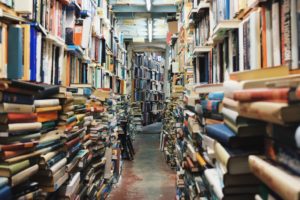by Elizabeth Roach and Emily Pressman—
This interdisciplinary course examines how novelists, poets, and historians have wrestled with and made sense of the past, and their own relation to it.
School: St. Andrew’s School, Middletown, Delaware
Department: English Department and History Department (a fully integrated interdisciplinary class, available to seniors only, the course is double-credit, fulfilling requirements in both English and History)
Teachers: Elizabeth Roach (English) and Emily Pressman (History)
Course Overview, Conception, and Pedagogical Approach:
This interdisciplinary course examines how novelists, poets, and historians have wrestled with and made sense of the past, and their own relation to it. Structured around a series of case studies at the intersection of literature, history, and memory, this course explores the relationship between the documented past and the imagined one. We study novels, plays, and poems deeply shaped by the social and cultural moments from which they emerged,and consider how an understanding of the historical circumstances that produced a work of literature can inform our reading of it. We also examine how writers of fiction have used history as source, inspiration and charge. Can the imaginative work of literature actually help us more fully understand the“real” past? What responsibility does the novelist have to history? We also consider how the construction of a narrative—the storytelling—of a novelist differs from that of a historian. What might each learn from the other?
Over the years, we have pursued these questions through the following texts:
Toni Morrison, Beloved (1987) and primary and secondary historical sources on slavery, race and abolition.
Tommy Orange, There There (2018) and primary and secondary historical sources engaging both contemporary urban experiences and the history of Native Americans.
Pat Barker, Regeneration (1991) and primary and secondary historical sources on World War I, gender and sexuality, the poetry of the Great War, and shell shock and traumatic memory.
Junot Díaz, The Brief Wondrous Life of Oscar Wao (2007), and primary and secondary historical sources on the Trujillo regime and the erasure of history in the Dominican Republic.
Colum McCann, TransAtlantic (2013) and primary and secondary historical sources on Frederick Douglass and his 1845 visit to Ireland, the aftermath of World War I, and the 1998 Good Friday peace agreement.
Tony Kushner, Angels in America (1991, rev. 2018) and primary and secondary historical sources on homosexuality and the LGBTQ rights movement, Mormonism, the AIDS crisis and Reagan Era America, and McCarthyism.
Our main goal is to develop and refine the analytical skills students worked on in previous years, as literary critics, historians, and writers in both of these disciplines. In the process, we hope to help develop in students a life-long love of reading and thinking about literature and history—and the complex relationship between the two. We emphasize developing the skills of reading texts in both disciplines with confidence, interest, and subtlety. We focus on how to think critically: how to construct complex and nuanced hypotheses and demonstrate them effectively with careful use of evidence, and how to encounter new ideas and arguments and be able to evaluate them with intelligence and sophistication.
We begin the year each year with a study of the historiography of American slavery, the slave narrative in American history and literature, Toni Morrison’s Beloved, and primary sources from the Margaret Garner case that inspired Morrison. Through student-driven seminar discussions, we examine the conversation between the source material and Beloved, considering especially the relationship between personal and national memory. Students write two short journals (2 page reading responses), and a paper on the end of Part I of the novel; following the paper, they engage in an oral exhibition (see description below). In addition, students engage in archival research from newspaper accounts of the Garner case.
The paper assignment below is the culminating project for our study of Beloved; it asks students to weave together all of the layers of our interdisciplinary study into an 8-10 page paper. We read and give feedback to rough drafts of this paper.
Beloved Final Paper Assignment
“For once, reality surpassed the wildest thought of fiction.”
— Samuel May, The Fugitive Slave Law, and its Victims (1856)
From Toni Morrison, “The Site of Memory” in Inventing the Truth: The Art and Craft of Memoir, William Zinsser, ed. (New York: Houghton Mifflin, 1995).
Over and over, the writers [of slave narratives] pull the narrative up short with a phrase such as, “But let us drop a veil over these proceedings too terrible to relate.” In shaping the experience to make it palatable to those who were in a position to alleviate it, they were silent about many things, and they “forgot” many other things.There was a careful selection of the instances that they would record and a careful rendering of those that they chose to describe. Lydia Maria Child identified the problem in her introduction to “Linda Brent’s” tale of sexual abuse: “I am well aware that many will accuse me of indecorum for presenting these pages to the public; for the experiences of this intelligent and much-injured woman belong to a class which some call delicate subjects, and others indelicate. This peculiar phase of Slavery has generally been kept veiled; but the public ought to be made acquainted with its monstrous features,and I am willing to take the responsibility of presenting them with the veil drawn [aside]..”[1]
But most importantly—at least for me—there was no mention of their interior life.
For me—a writer in the last quarter of the twentieth century, not much more than a hundred years after Emancipation, a writer who is black and a woman—the exercise is very different. My job becomes how to rip that veil drawn over “proceedings too terrible to relate.” The exercise is also critical for any person who is black, or who belongs to any marginalized category, for, historically, we were seldom invited to participate in the discourse even when we were its topic.
Moving that veil aside requires, therefore, certain things. First of all, I must trust my own recollections. I must also depend on the recollections of others. Thus memory weighs heavily in what I write, in how I begin and in what I find to be significant. Zora Neale Hurston said, “Like the dead-seeming cold rocks, I have memories within that came out of the material that went to make me.” These “memories within” are the subsoil of my work. But memories and recollections won’t give me total access to the unwritten interior life of these people. Only the act of the imagination can help me.
* * * * *
One of the questions at the heart of Beloved is how we should deal with traumatic memories of the past as individuals, and as members of communities facing a shared past. What place should the past occupy in our present and future? Look closely at the two endings of the novel and consider how Morrison’s characters wrestle with the question of the role of the past, and how she as novelist also wrestles with this question. Consider both her work as writer of fiction and her work as “historian” drawing on the documented past – of Margaret Garner specifically, and slavery more generally. Develop an argument about how the ending of the novel and Morrison as author answer these questions. What do the details of Sethe and Paul D’s reunion in the penultimate ending, and the very last chapter, suggest about the role the past should play in our lives? What, ultimately, does Morrison argue about the past, personal and historical memory, and the relationship of these ways of remembering to identity?
Following their completion of the paper, students engage in an hour-long oral exhibition with one or two of their peers, to allow them a chance to reflect on their own work—we believe that the process of learning does not stop when students hand in their essays. Exhibitions allow students to refine their speaking skills, demonstrate their mastery of a given text or subject, experience learning as a collaborative enterprise, and refine and extend the arguments of their essays. Even more importantly, they teach students to ask probing and incisive questions about literature and history, their own writing, and the work of their peers.
Students understand—through exhibitions—that the best, the most productive learning happens when we push each other to clarify, develop, complicate, and refine each other’s thinking, that, in essence, if we work collaboratively, if we put pressure on each other’s arguments, we arrive at a more sophisticated way to think about a work of literature. We also improve our writing and argumentation skills.
Exhibitions are rigorous but not competitive, intense but generous in spirit and tone. They enact collaboration and ignite curiosity. Although this kind of teaching is time intensive, it is exciting and energizing for both students and teachers. As teachers, we see the learning happen in front of us which is so much better and more rewarding than wondering if students have actually read, let alone understood, our written feedback (although we also give extensive written feedback on their papers, their written preparation for the oral, and their work during the oral exhibition as well).
Furthermore, while practicing and honing their skills in scholarly discourse, students also learn how to listen well and converse in daily (and perhaps difficult) conversations in life more generally. In other words, the benefits of this kind of learning are far-reaching and exponential.
Preparing for the Exhibition Oral
We provide students with the following guidance in their preparation for the oral exhibitions.
Use the questions and suggestions below as you prepare for the oral component of the Exhibition. Your oral will be a rigorous discussion of the ideas and arguments presented in your essay. We expect your essay to be clear, persuasive and polished. At the same time, we recognize that your final essay is, in some important sense, a work in progress. The oral will offer you the opportunity to expand, amplify, and rethink your arguments in a discussion with your teachers. The goal is to try to improve and refine the arguments of your essay; the defense should be an open-minded consideration of your own work and not an attempt to defend your claims at all cost.
- Make sure you can orally articulate your thesis without reading from your paper (this is the first thing that we will ask you to do in the oral).
- What are the strengths and weaknesses of your central argument?
- Assess your thesis and identify the strengths and weaknesses of your argument. Then, most importantly, articulate how you would address the weaknesses in your paper. You need to show how you have rethought and reconsidered your argument, what moments in the text you would use and why, and then be able to clearly and succinctly re-articulate, re-imagine the next version of your paper. Do NOT summarize your paper or the process of writing your paper.
- Review the novel’s plot, character, etc. (you are responsible for the entire text, not merely those sections or characters you focused on). Are there any scenes or passages that you failed to discuss which, in retrospect, are relevant to your essay— moments that would further support or complicate your argument?
- How successfully have you handled the text? Are your readings of specific moments and passages thorough and nuanced?
- How logically does the argument progress? Are there any holes or contradictions within the essay? Does the argument’s structure work? This is not a question of “flow” but of the crafting of your argument so that it builds in a clear, convincing and compelling way.
- Think of other literary texts you have read over the last two years. Are there any connections – thematic, formal, stylistic, the questions raised – between these texts and your Exhibition text?
You will be asked many more questions specific to your essay, but you should be prepared to answer all of the above. The best orals, in fact, are the orals for which the student takes ownership and sets the intellectual agenda. This is an exciting chance for you to demonstrate how far you have come as a literary scholar at St. Andrew’s.
[1] Linda Brent was the pen name of Harriet Jacobs, author of the slave narrative Incidents in the Life of a Slave Girl (1861)





